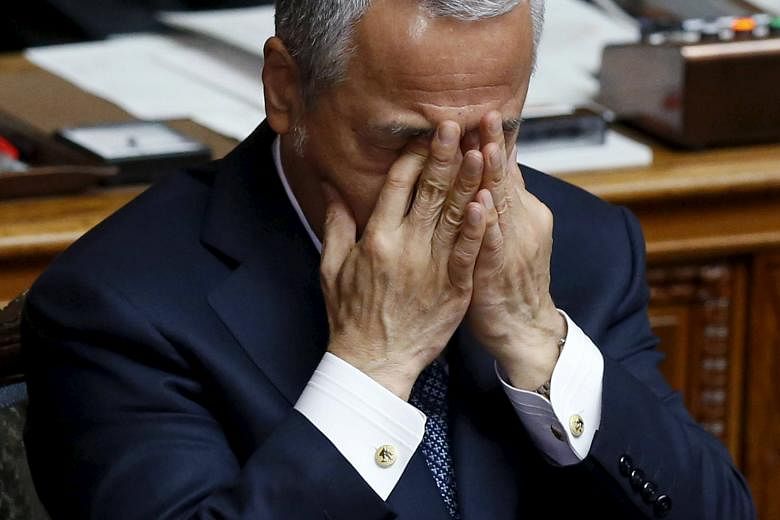TOKYO • Japanese Economy Minister Akira Amari resigned abruptly yesterday to take responsibility for a political funding scandal that has rocked the government, but denied having taken bribes.
In a packed news conference, he acknowledged taking money from a construction firm executive, but said he told his aides to correctly record it as a political donation.
He added that he was stepping down to prevent the scandal from becoming a distraction from the Abe administration's drive to pull the country out of deflation.
"Japan is finally emerging from deflation," he said. "We need to pass legislation through Parliament for steps to beat deflation and create a strong economy as soon as possible. Anything that hampers this must be eliminated, and I'm no exception. I, therefore, would like to resign as minister to take responsibility."
Part of the money has gone missing because of mistakes by his secretaries, he said, but two of them have resigned and he must take responsibility as their supervisor.
The resignation of Mr Amari, 66, who has spearheaded Prime Minister Shinzo Abe's economic policies, could pose a setback to the "Abenomics" growth plan, analysts said.
Mr Amari is a close ally of the Prime Minister and a core member of his policy team. He led Japan's negotiations for the Trans-Pacific Partnership (TPP) free trade bloc.
"This is definitely not good news for Abe and it's going to make it harder to sell the TPP," said Mr Jeffrey Kingston, director of Asian studies at Temple University's Japan campus. "Corruption is just not something that goes down well with voters, and there's going to be a lot of media scrutiny. It's going to be a bit of a rough road."
But the government moved swiftly to contain the fallout by appointing Mr Nobuteru Ishihara less than 90 minutes after Mr Amari announced his resignation.
Mr Abe stressed that reforms would continue. "Abenomics is at a critical juncture. I'd like him to use his full capacity to pull Japan out of deflation and put its economy on a growth path," he told reporters.
Mr Ishihara, 58, is the son of outspoken nationalist Shintaro Ishihara, a former governor of Tokyo, but is seen as less extreme in his views than his father. He served as environment and nuclear crisis minister under Mr Abe and was also secretary-general of Mr Abe's ruling Liberal Democratic Party.
Mr Hidenobu Tokuda, a senior economist at Mizuho Research Institute in Tokyo, said he would want to see how Mr Ishihara manages his new role but does not expect an immediate impact on monetary or fiscal policy.
"He doesn't have much previous experience in the Cabinet. By choosing someone with less experience, this could give Abe and his office even more influence over economic policy," Mr Tokuda said.
REUTERS

